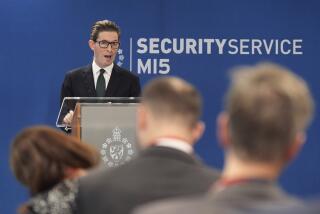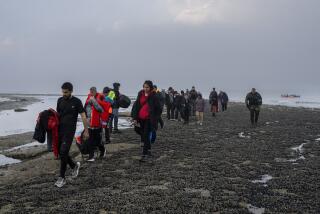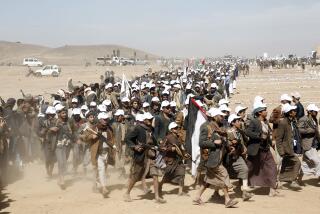Britain’s openness makes for ticklish anti-terror effort
LONDON — The Egyptian government has convicted Yasser al Serri in absentia for a failed attempt to assassinate the prime minister. In London, Serri runs the Islamic Observation Center, which he says is a human rights charity.
In Yemen, Abu Hamza Masri is accused of masterminding a 1998 plot to bomb British targets in Aden. The radical cleric, who lost both hands to a land mine in Afghanistan, preaches Muslim unity against U.S. aggression from his London mosque.
Wanted in his native Saudi Arabia for trying to undermine the royal family, Mohammed Masari defends the terror attacks on New York and the Pentagon as “acts of war” that respond to military assaults on Iraq and the Palestinians.
“If you wage war against people, they can wage war against you,” said Masari, who successfully fended off deportation from Britain in 1996. “If you kill civilians, they can kill civilians.”
Wanted by foreign governments and publicly accused of supporting Osama bin Laden, the chief suspect in the Sept. 11 attacks, these extremists and others like them are an embarrassment to the government of Britain, long a haven for Arab exiles.
Exiles may share goals of suicide hijackers
They may share the goals of the suspected suicide hijackers: driving the United States out of the Middle East, halting the 10-year military and economic campaign against Iraq, and defeating Israel in the fight for a Palestinian state. Some may contend the attacks on the U.S. were justified.
But does that make them terrorists?
This is the question -- indeed, the problem -- that governments such as Britain and the United States face in trying to fight a shadowy enemy within the framework of a democratic society. How do you decide who is a terrorist, and how do you prove it while protecting basic rights such as freedom of speech and religion, and Britain’s long-held belief in political asylum? Where do you draw the line between dissidents and terrorists?
One man’s terrorist is another man’s freedom fighter, argue the Islamic radicals who make up a small minority of Britain’s approximately 2 million Muslims. They say they are legal residents and second-generation Britons operating within the law to support Muslims in Kashmir, Chechnya, Iraq and anywhere else their co-religionists are engaged in what they call liberation struggles.
They say it would be impossible for them to plan or organize attacks with British intelligence services continually monitoring their activities. In fact, no one has alleged a direct link between these men and known suspects in the Sept. 11 suicide assaults.
But to the governments that want them and to a growing segment of the British population, some of these militants are foot soldiers in a borderless war of terror where previous ground rules and Geneva Conventions do not apply. Some members of Parliament and the media are pushing for the militants’ arrest or expulsion, arguing that they may not be armed combatants but that their political and possibly financial support of terrorism cannot be legal.
“They are operating in the gray zone,” said Magnus Ranstorp, a terrorism expert at the University of St. Andrews in Scotland.
Prime Minister Tony Blair this week announced a sweeping new effort to help the government rout suspected terrorists out of the crowd -- and country. Within six weeks, his administration will introduce legislation to crack down on money laundering, tighten asylum and extradition laws, and make incitement to religious hatred a criminal offense.
“We cannot have a situation in which it takes years to extradite people,” Blair told BBC television. “We cannot have a situation where, if we know someone is a terrorist, we do not have the legal power to detain them indefinitely until we find a country to deport them to.”
The new laws may be a response to complaints from the governments of Egypt, Yemen and other countries that the United States and Britain are demanding cooperation in their war on terrorism while refusing to help the other nations fight their own. During a visit to Cairo last week, Foreign Secretary Jack Straw reportedly was rebuked by Egyptian President Hosni Mubarak for “harboring terrorists.”
Britain has long been considered a capital of the Arab and Muslim worlds. When civil war broke out in Lebanon in the 1970s, well-to-do Arabs who vacationed there headed north instead. Coffeehouses, sweet shops and other businesses grew up around them, and London became known as Beirut on the Thames.
Political repression sent waves of Arab and Muslim refugees to Britain in the 1980s and 1990s. With mosques and Muslim charities, half a dozen Arabic newspapers, busy international airports and myriad financial institutions, London became a base for extremists, too.
The radicals came here to campaign for their causes in the English- and Arabic-language media. They raised money and recruited militants among disaffected Muslim youths, some of whom went off to military training camps in Yemen and Afghanistan and onto battlefronts in places such as Chechnya and Bosnia-Herzegovina.
Government didn’t employ bans, arrests
For many years, the British government’s approach was to monitor extremists rather than shut them down. Bans and arrests would simply drive the groups underground, the reasoning was, making it more difficult to control them.
But British intelligence services did not control them all. Ranstorp said cells of no more than 20 terrorists associated with bin Laden’s network have used Britain for bank and credit card fraud, “identity theft” and more.
After the 1998 bombings of the U.S. Embassies in Kenya and Tanzania, in which 224 people died, Britain arrested Khalid al Fawwaz, accused of providing a satellite telephone to bin Laden so he could organize the attacks. Al Fawwaz is in London’s Belmarsh Prison fighting extradition to the United States.
Last year, the British government passed legislation making it illegal to support terrorism abroad and banned 21 organizations from operating here. Among them are bin Laden’s al-Qaida network, Egypt’s Islamic Jihad, the Armed Islamic Group from Algeria, and the Palestinian groups Hamas, Islamic Jihad and Abu Nidal.
Those groups are nowhere to be seen here now, but their supporters and extremist propaganda remain. After the ban went into effect in February, a video purporting to show bin Laden troops training for an attack on the U.S. destroyer Cole in Yemen was available for about $15 from Islamic bookstores. Another video showing members of the banned Salafist Group for Call and Combat ambushing the Algerian army was screened at Abu Hamza’s Finsbury Park mosque, according to journalists who speak Arabic.
Particularly irritating to the British press is Syrian-born Omar Bakri Mohammed of the small Al Muhajiroun group, which seeks a worldwide Islamic state. He was dubbed the “Tottenham Ayatollah” by the liberal Independent on Sunday newspaper for the religious fatwas he has issued from the North London neighborhood of Tottenham. The latest called for an Islamic trial of Pakistani President Pervez Musharraf, who has agreed to cooperate with the U.S. military campaign against bin Laden.
“These people are cheerleaders for terrorists,” said Andrew Dismore, a Labor member of parliament who has followed their activities. “They are always seen as a bit of a joke. I think not.”
So far, the anti-terrorism law passed last year has been used to arrest suspected members of a breakaway Irish Republican Army group, as well as alleged members of bin Laden’s network. Among them is Haydar Abu Doha, the alleged leader of an Algerian cell that was planning to bomb Los Angeles International Airport during millennium celebrations. He is fighting extradition to the United States.
The government in Cairo wants Serri, a suspected bin Laden supporter who Egyptian officials say was behind the massacre of dozens of tourists in Luxor in 1997. British newspapers now link Serri to the suicide bombers who last month killed Ahmed Shah Masoud, the leader of the Taliban government’s main opposition in Afghanistan.
“The terrorists are in Egypt, not London,” Serri said, referring to the Cairo government in a telephone interview. “The British government has no evidence against me about anything.”
The same appears to be true in the case of Omar Mahmoud abu Omar, also known as Abu Qatada, a Palestinian who Jordanian officials say was involved in a gin Laden-backed plot to attack Americans and Israelis in Jordan during millennium celebrations.
The British government will not comment on Abu Qatada, who won asylum here eight years ago, or other individuals, but officials have suggested privately that they lacked evidence to initiate extradition proceedings.
In the past, the British government has taken the position that it would not send suspected terrorists back to countries where there is a death penalty or where the accused could not be assured a fair trial.
Now, to make it easier to detain, deport or extradite suspected terrorists, Blair is seeking to give police the power to hold people indefinitely without charge--which political activists and civil libertarians fear will lead to a crackdown on dissidents operating within the law.
“The fear is that a campaign against terrorism may be an opportunity for repression,” said Sayed Fergani, a spokesman for the Renaissance Party, which opposes the government in Tunisia.
Meanwhile, Al Muhajiroun militants are dismissive of the government’s efforts. Anjem Choudary, a British attorney and spokesman for the group, says laws to silence the extremists will not stand up in court. He argues that young Muslims have a right to undergo military training where they please and to send money to the families of Muslim combatants around the world.
Noting that there are hundreds of mosques in Britain, Choudary said, “Go into any mosque on a Friday and they are collecting for one cause or another, for Chechnya, Palestine, Kashmir. That money is going to families involved in the struggle. It is a problem for the government. How many people are they going to arrest?”
More to Read
Sign up for Essential California
The most important California stories and recommendations in your inbox every morning.
You may occasionally receive promotional content from the Los Angeles Times.










